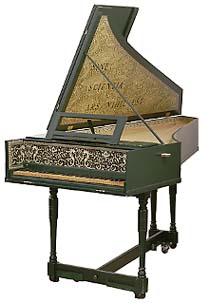 |
The HarpsichordA stringed keyboard instrument developed during the 14th and 15th century, the harpsichord was widely used until the early 19th century when it was superseded by the piano. 20th century revivals of the instrument feature music of the 16th to 18th centuries with particular emphasis on Bach's music. The metal strings are sounded by plucking with a small piece of material called a plectrum which is attached to the key mechanism. A downward stroke on the key raises the plectrum on the other end so that it plucks the string and then pivots so that it does not touch the string on the way down.
|
Console instruments
Musical instruments
